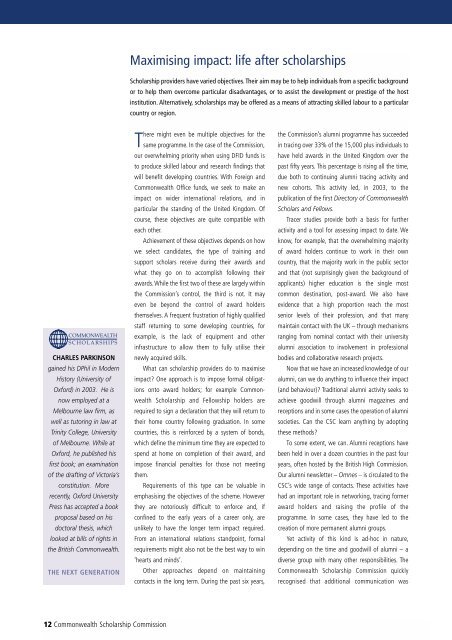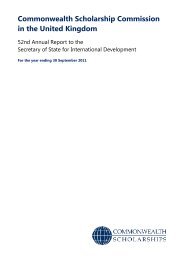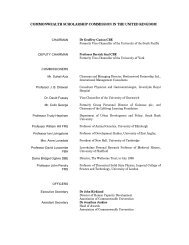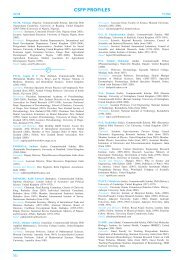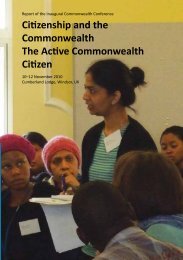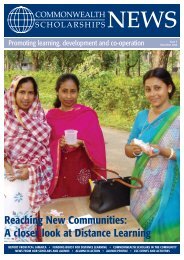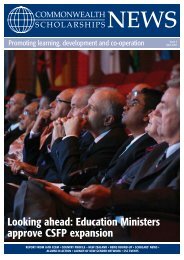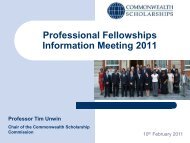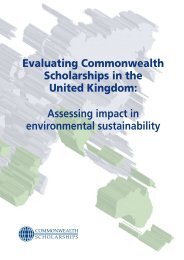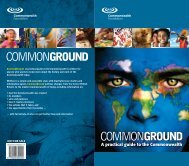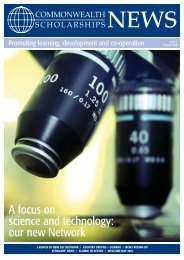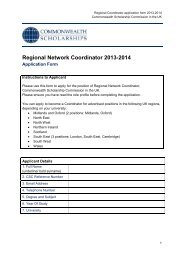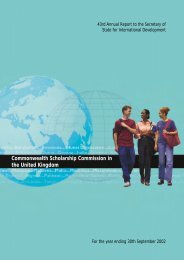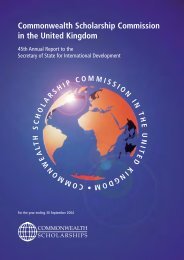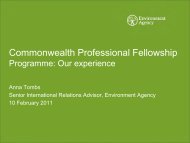46th Annual Report - Commonwealth Scholarship Commission in ...
46th Annual Report - Commonwealth Scholarship Commission in ...
46th Annual Report - Commonwealth Scholarship Commission in ...
- No tags were found...
Create successful ePaper yourself
Turn your PDF publications into a flip-book with our unique Google optimized e-Paper software.
Maximis<strong>in</strong>g impact: life after scholarships<strong>Scholarship</strong> providers have varied objectives.Their aim may be to help <strong>in</strong>dividuals from a specific backgroundor to help them overcome particular disadvantages, or to assist the development or prestige of the host<strong>in</strong>stitution. Alternatively, scholarships may be offered as a means of attract<strong>in</strong>g skilled labour to a particularcountry or region.CHARLES PARKINSONga<strong>in</strong>ed his DPhil <strong>in</strong> ModernHistory (University ofOxford) <strong>in</strong> 2003. He isnow employed at aMelbourne law firm, aswell as tutor<strong>in</strong>g <strong>in</strong> law atTr<strong>in</strong>ity College, Universityof Melbourne. While atOxford, he published hisfirst book; an exam<strong>in</strong>ationof the draft<strong>in</strong>g of Victoria’sconstitution. Morerecently, Oxford UniversityPress has accepted a bookproposal based on hisdoctoral thesis, whichlooked at bills of rights <strong>in</strong>the British <strong>Commonwealth</strong>.THE NEXT GENERATIONThere might even be multiple objectives for thesame programme. In the case of the <strong>Commission</strong>,our overwhelm<strong>in</strong>g priority when us<strong>in</strong>g DFID funds isto produce skilled labour and research f<strong>in</strong>d<strong>in</strong>gs thatwill benefit develop<strong>in</strong>g countries. With Foreign and<strong>Commonwealth</strong> Office funds, we seek to make animpact on wider <strong>in</strong>ternational relations, and <strong>in</strong>particular the stand<strong>in</strong>g of the United K<strong>in</strong>gdom. Ofcourse, these objectives are quite compatible witheach other.Achievement of these objectives depends on howwe select candidates, the type of tra<strong>in</strong><strong>in</strong>g andsupport scholars receive dur<strong>in</strong>g their awards andwhat they go on to accomplish follow<strong>in</strong>g theirawards. While the first two of these are largely with<strong>in</strong>the <strong>Commission</strong>’s control, the third is not. It mayeven be beyond the control of award holdersthemselves. A frequent frustration of highly qualifiedstaff return<strong>in</strong>g to some develop<strong>in</strong>g countries, forexample, is the lack of equipment and other<strong>in</strong>frastructure to allow them to fully utilise theirnewly acquired skills.What can scholarship providers do to maximiseimpact? One approach is to impose formal obligationsonto award holders; for example <strong>Commonwealth</strong><strong>Scholarship</strong> and Fellowship holders arerequired to sign a declaration that they will return totheir home country follow<strong>in</strong>g graduation. In somecountries, this is re<strong>in</strong>forced by a system of bonds,which def<strong>in</strong>e the m<strong>in</strong>imum time they are expected tospend at home on completion of their award, andimpose f<strong>in</strong>ancial penalties for those not meet<strong>in</strong>gthem.Requirements of this type can be valuable <strong>in</strong>emphasis<strong>in</strong>g the objectives of the scheme. Howeverthey are notoriously difficult to enforce and, ifconf<strong>in</strong>ed to the early years of a career only, areunlikely to have the longer term impact required.From an <strong>in</strong>ternational relations standpo<strong>in</strong>t, formalrequirements might also not be the best way to w<strong>in</strong>‘hearts and m<strong>in</strong>ds’.Other approaches depend on ma<strong>in</strong>ta<strong>in</strong><strong>in</strong>gcontacts <strong>in</strong> the long term. Dur<strong>in</strong>g the past six years,the <strong>Commission</strong>’s alumni programme has succeeded<strong>in</strong> trac<strong>in</strong>g over 33% of the 15,000 plus <strong>in</strong>dividuals tohave held awards <strong>in</strong> the United K<strong>in</strong>gdom over thepast fifty years. This percentage is ris<strong>in</strong>g all the time,due both to cont<strong>in</strong>u<strong>in</strong>g alumni trac<strong>in</strong>g activity andnew cohorts. This activity led, <strong>in</strong> 2003, to thepublication of the first Directory of <strong>Commonwealth</strong>Scholars and Fellows.Tracer studies provide both a basis for furtheractivity and a tool for assess<strong>in</strong>g impact to date. Weknow, for example, that the overwhelm<strong>in</strong>g majorityof award holders cont<strong>in</strong>ue to work <strong>in</strong> their owncountry, that the majority work <strong>in</strong> the public sectorand that (not surpris<strong>in</strong>gly given the background ofapplicants) higher education is the s<strong>in</strong>gle mostcommon dest<strong>in</strong>ation, post-award. We also haveevidence that a high proportion reach the mostsenior levels of their profession, and that manyma<strong>in</strong>ta<strong>in</strong> contact with the UK – through mechanismsrang<strong>in</strong>g from nom<strong>in</strong>al contact with their universityalumni association to <strong>in</strong>volvement <strong>in</strong> professionalbodies and collaborative research projects.Now that we have an <strong>in</strong>creased knowledge of ouralumni, can we do anyth<strong>in</strong>g to <strong>in</strong>fluence their impact(and behaviour)? Traditional alumni activity seeks toachieve goodwill through alumni magaz<strong>in</strong>es andreceptions and <strong>in</strong> some cases the operation of alumnisocieties. Can the CSC learn anyth<strong>in</strong>g by adopt<strong>in</strong>gthese methods?To some extent, we can. Alumni receptions havebeen held <strong>in</strong> over a dozen countries <strong>in</strong> the past fouryears, often hosted by the British High <strong>Commission</strong>.Our alumni newsletter – Omnes – is circulated to theCSC’s wide range of contacts. These activities havehad an important role <strong>in</strong> network<strong>in</strong>g, trac<strong>in</strong>g formeraward holders and rais<strong>in</strong>g the profile of theprogramme. In some cases, they have led to thecreation of more permanent alumni groups.Yet activity of this k<strong>in</strong>d is ad-hoc <strong>in</strong> nature,depend<strong>in</strong>g on the time and goodwill of alumni – adiverse group with many other responsibilities. The<strong>Commonwealth</strong> <strong>Scholarship</strong> <strong>Commission</strong> quicklyrecognised that additional communication was12 <strong>Commonwealth</strong> <strong>Scholarship</strong> <strong>Commission</strong>


